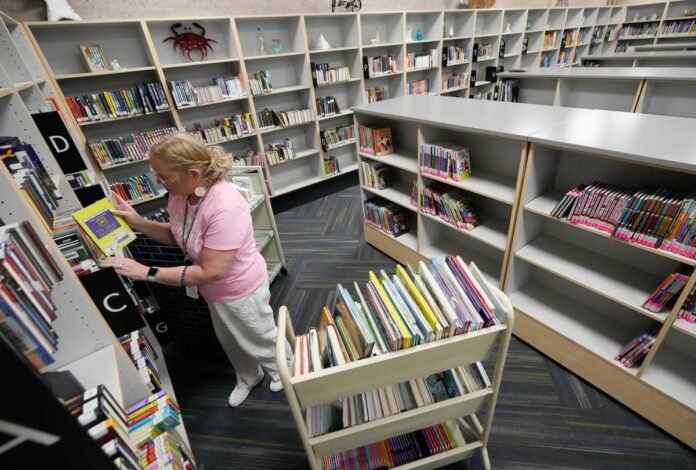Fear of unintentionally violating Utah’s sensitive materials law has prompted some teachers to get rid of their classroom libraries, state auditors found.
One teacher told auditors she no longer recommends books to students, while several school administrators and librarians reported being “verbally attacked” by community members who found certain materials offensive. A school librarian also shared that a parent stole a book from the library and refused to return it because they objected to its cover.
Those challenges stem, in part, from two elements that are missing: clear communication to teachers and librarians about the law, and “proactive” policies to prevent potentially sensitive materials from reaching students, according to a report released Wednesday by the Legislative Auditor General.
“If policies remain focused on the removal of materials, rather than proactively selecting materials, [schools] may experience recurring cycles of challenges that could be avoided with clearer front-end selection standards,” the audit stated.
The report, presented Wednesday to the Legislative Audit Subcommittee, examined how well school districts are complying with state law governing the removal of pornographic or sensitive materials in schools. Aside from a few “minor compliance issues,” auditors found no instances of banned materials in schools.
As part of the review, auditors also tested the effectiveness of schools’ online content filters and found they successfully blocked inappropriate material, even when auditors entered explicit search terms. However, auditors said some schools could benefit from keyword blockers to prevent certain searches altogether.
What is Utah’s ‘sensitive materials’ law?
Utah law governing sensitive materials in schools has undergone two major revisions in the last five years, according to the report.
In 2022, Utah passed HB374, which prohibited books containing “pornographic or indecent content” from public school libraries and classrooms. The law also required schools to have processes in place to determine if materials in classrooms and school libraries were sensitive, the report stated.
Then, last year, lawmakers changed the law again with HB29, which introduced new standards for evaluating sensitive materials, as well as a mechanism for the statewide removal of a book.
Current law asks local education leaders to evaluate whether a challenged book amounts to “objective” sensitive material — pornographic or otherwise indecent material, as defined by Utah code.
If at least three school districts (or at least two school districts and five charter schools) determine a book amounts to “objective sensitive material,” it must be removed from all public schools in the state.
A book could also be considered “subjective” sensitive material, which may not meet the state’s definition of pornography or “indecent public displays,” but would otherwise be considered “harmful” to youth. In that case, the book could still be removed from local shelves, but the statewide book ban threshold only applies to “objective” sensitive material.
The main difference in reviewing both types of material, the report stated, is “objective material is only determined based on the excerpts that are presented in the challenge as sensitive. … Only if a material is not found to be objectively sensitive does it then undergo subjective review, which means the work is considered as a whole.”
Since the law took effect in July 2024, 18 titles have been ordered off public school bookshelves.
Teachers aren’t always being notified when a book is banned
Auditors found that while most schools have updated their policies to follow the 2024 law, they haven’t “adequately” communicated sensitive materials processes with teachers.
Auditors noted that under an administrative rule, school staff could lose their licenses if they’re found to have knowingly given students sensitive materials.
“We spoke with several English language arts teachers to understand their comfort with the sensitive materials law and found communication about removed books varied among [schools],” the report stated.
In some cases, auditors found that teachers weren’t being told when a book met the threshold for statewide removal.
The Utah State Board of Education must notify districts within 10 days of a book meeting the criteria for statewide removal. While auditors said this communication process has been effective, districts are not passing along the information to school-level staff.
“These inconsistencies in communication could lead to teachers not being informed of necessary book removals, and, as a result, they may have sensitive materials in their classrooms,” state auditors said, emphasizing the need for districts to develop better communication policies.
Auditors also noted that teachers haven’t been given clear guidance on selecting materials for their classroom libraries.
“Implementing policy changes to provide guardrails for teachers and direction within [schools] could help [schools] better support their staff… A lack of policy or procedures could leave teachers vulnerable to disciplinary action or community scrutiny.”
Proactive, not reactive, policies
Auditors suggested that while Utah’s current law allows districts to “comply more easily,” it also emphasizes “removal rather than selection, increasing later workloads and ongoing sensitive material challenges.”
Public pressure, the report states, drove the recent changes to the law.
“There are social media groups and websites dedicated entirely to rating books based on content these groups find concerning and advocating for parents to challenge these books in their districts,” auditors stated. “Because of these concerns, policymakers have provided avenues for book removals, rather than ensuring concerning content never enters school libraries.”
All 41 school districts in Utah have policies outlining material selection criteria, the report stated. Those criteria include age appropriateness, educational significance, the author’s reputation and requests from teachers and students.
“Librarians are often the primary staff members reviewing books for purchase,” auditors stated. “This puts the responsibility for ensuring that potentially sensitive materials don’t enter the library primarily on the librarians.”
To relieve some of that pressure, auditors suggested that lawmakers consider requiring schools to implement policies for library book selections, which could include a review process by staff or a committee before putting books on the shelves.
“By creating a review process, librarians would have additional professional protection when or if books are challenged,“ the report states.






